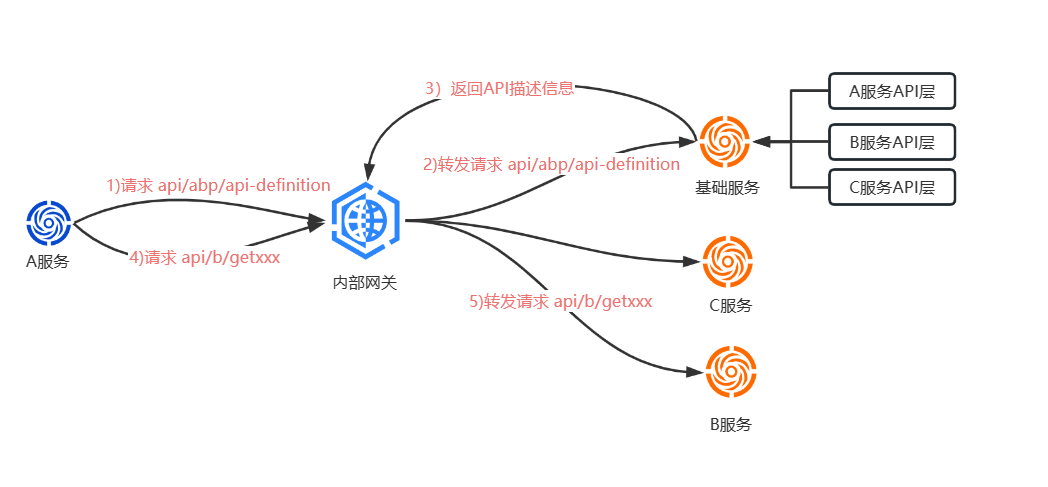Abp Vnext 动态(静态)API客户端源码解析
- 服务端:根据接口定义方法的签名生成路由,并暴露Api。
- 客户端:根据接口定义方法的签名生成请求,通过HTTPClient调用。
一.动态API客户端
context.Services.AddHttpClientProxies(
typeof(IdentityApplicationContractsModule).Assembly, //接口层程序集
RemoteServiceName //远程服务名称
);
public static IServiceCollection AddHttpClientProxy(this IServiceCollection services, Type type, string remoteServiceConfigurationName = "Default", bool asDefaultService = true)
{
/*省略一些代码...*/
Type type2 = typeof(DynamicHttpProxyInterceptor<>).MakeGenericType(type); //拦截器
services.AddTransient(type2);
Type interceptorAdapterType = typeof(AbpAsyncDeterminationInterceptor<>).MakeGenericType(type2);
Type validationInterceptorAdapterType = typeof(AbpAsyncDeterminationInterceptor<>).MakeGenericType(typeof(ValidationInterceptor));
if (asDefaultService)
{
//生成代理,依赖注入到容器
services.AddTransient(type, (IServiceProvider serviceProvider) => ProxyGeneratorInstance.CreateInterfaceProxyWithoutTarget(type, (IInterceptor)serviceProvider.GetRequiredService(validationInterceptorAdapterType), (IInterceptor)serviceProvider.GetRequiredService(interceptorAdapterType)));
}
services.AddTransient(typeof(IHttpClientProxy<>).MakeGenericType(type), delegate (IServiceProvider serviceProvider)
{
//生成代理,通过HttpClientProxy封装,依赖注入到容器
object obj = ProxyGeneratorInstance.CreateInterfaceProxyWithoutTarget(type, (IInterceptor)serviceProvider.GetRequiredService(validationInterceptorAdapterType), (IInterceptor)serviceProvider.GetRequiredService(interceptorAdapterType));
return Activator.CreateInstance(typeof(HttpClientProxy<>).MakeGenericType(type), obj);
});
return services;
} public override async Task InterceptAsync(IAbpMethodInvocation invocation)
{
var context = new ClientProxyRequestContext(
await GetActionApiDescriptionModel(invocation), //获取Api描述信息
invocation.ArgumentsDictionary,
typeof(TService));
if (invocation.Method.ReturnType.GenericTypeArguments.IsNullOrEmpty())
{
await InterceptorClientProxy.CallRequestAsync(context);
}
else
{
var returnType = invocation.Method.ReturnType.GenericTypeArguments[0];
var result = (Task)CallRequestAsyncMethod
.MakeGenericMethod(returnType)
.Invoke(this, new object[] { context });
invocation.ReturnValue = await GetResultAsync(result, returnType); //调用CallRequestAsync泛型方法
}
} protected virtual async Task<ActionApiDescriptionModel> GetActionApiDescriptionModel(IAbpMethodInvocation invocation)
{
var clientConfig = ClientOptions.HttpClientProxies.GetOrDefault(typeof(TService)) ?? //获取远程服务名称
throw new AbpException($"Could not get DynamicHttpClientProxyConfig for {typeof(TService).FullName}.");
var remoteServiceConfig = await RemoteServiceConfigurationProvider.GetConfigurationOrDefaultAsync(clientConfig.RemoteServiceName);//获取远程服务端点配置
var client = HttpClientFactory.Create(clientConfig.RemoteServiceName); //创建HttpClient
return await ApiDescriptionFinder.FindActionAsync(
client,
remoteServiceConfig.BaseUrl, //远程服务地址
typeof(TService),
invocation.Method
);
} "RemoteServices": {
"Default": {
"BaseUrl": "http://localhost:44388"
},
"XXXDemo":{
"BaseUrl": "http://localhost:44345"
}
},public async Task<ActionApiDescriptionModel> FindActionAsync(
HttpClient client,
string baseUrl,
Type serviceType,
MethodInfo method)
{
var apiDescription = await GetApiDescriptionAsync(client, baseUrl); //获取Api描述信息并缓存结果
//TODO: Cache finding?
var methodParameters = method.GetParameters().ToArray();
foreach (var module in apiDescription.Modules.Values)
{
foreach (var controller in module.Controllers.Values)
{
if (!controller.Implements(serviceType)) //不继承接口跳过,所以写控制器为什么需要要继承服务接口的作用之一便在于此
{
continue;
}
foreach (var action in controller.Actions.Values)
{
if (action.Name == method.Name && action.ParametersOnMethod.Count == methodParameters.Length) //签名是否匹配
{
/*省略部分代码 */
}
}
}
}
throw new AbpException($"Could not found remote action for method: {method} on the URL: {baseUrl}");
}
public virtual async Task<ApplicationApiDescriptionModel> GetApiDescriptionAsync(HttpClient client, string baseUrl)
{
return await Cache.GetAsync(baseUrl, () => GetApiDescriptionFromServerAsync(client, baseUrl)); //缓存结果
} protected virtual async Task<ApplicationApiDescriptionModel> GetApiDescriptionFromServerAsync(
HttpClient client,
string baseUrl)
{
//构造请求信息
var requestMessage = new HttpRequestMessage(
HttpMethod.Get,
baseUrl.EnsureEndsWith('/') + "api/abp/api-definition"
);
AddHeaders(requestMessage); //添加请求头
var response = await client.SendAsync( //发送请求并获取响应结果
requestMessage,
CancellationTokenProvider.Token
);
if (!response.IsSuccessStatusCode)
{
throw new AbpException("Remote service returns error! StatusCode = " + response.StatusCode);
}
var content = await response.Content.ReadAsStringAsync();
var result = JsonSerializer.Deserialize<ApplicationApiDescriptionModel>(content, DeserializeOptions);
return result;
}public virtual async Task<T> CallRequestAsync<T>(ClientProxyRequestContext requestContext)
{
return await base.RequestAsync<T>(requestContext);
}
public virtual async Task<HttpContent> CallRequestAsync(ClientProxyRequestContext requestContext)
{
return await base.RequestAsync(requestContext);
} protected virtual async Task<HttpContent> RequestAsync(ClientProxyRequestContext requestContext)
{
//获取远程服务名称
var clientConfig = ClientOptions.Value.HttpClientProxies.GetOrDefault(requestContext.ServiceType) ?? throw new AbpException($"Could not get HttpClientProxyConfig for {requestContext.ServiceType.FullName}.");
//获取远程服务端点配置
var remoteServiceConfig = await RemoteServiceConfigurationProvider.GetConfigurationOrDefaultAsync(clientConfig.RemoteServiceName);
var client = HttpClientFactory.Create(clientConfig.RemoteServiceName);
var apiVersion = await GetApiVersionInfoAsync(requestContext); //获取API版本
var url = remoteServiceConfig.BaseUrl.EnsureEndsWith('/') + await GetUrlWithParametersAsync(requestContext, apiVersion); //拼接完整的url
var requestMessage = new HttpRequestMessage(requestContext.Action.GetHttpMethod(), url) //构造HTTP请求信息
{
Content = await ClientProxyRequestPayloadBuilder.BuildContentAsync(requestContext.Action, requestContext.Arguments, JsonSerializer, apiVersion)
};
AddHeaders(requestContext.Arguments, requestContext.Action, requestMessage, apiVersion); //添加请求头
if (requestContext.Action.AllowAnonymous != true) //是否需要认证
{
await ClientAuthenticator.Authenticate( //认证
new RemoteServiceHttpClientAuthenticateContext(
client,
requestMessage,
remoteServiceConfig,
clientConfig.RemoteServiceName
)
);
}
HttpResponseMessage response;
try
{
response = await client.SendAsync( //发送请求
requestMessage,
HttpCompletionOption.ResponseHeadersRead /*this will buffer only the headers, the content will be used as a stream*/,
GetCancellationToken(requestContext.Arguments)
);
}
return response.Content;
} public override async Task Authenticate(RemoteServiceHttpClientAuthenticateContext context)
{
if (context.RemoteService.GetUseCurrentAccessToken() != false)
{
var accessToken = await GetAccessTokenFromHttpContextOrNullAsync(); //获取当前登录用户Token
if (accessToken != null)
{
context.Request.SetBearerToken(accessToken);
return;
}
}
await base.Authenticate(context);
}[DependsOn(typeof(AbpHttpClientIdentityModelWebModule))]
"UseCurrentAccessToken": "true"
}
} protected virtual void AddHeaders(
IReadOnlyDictionary<string, object> argumentsDictionary,
ActionApiDescriptionModel action,
HttpRequestMessage requestMessage,
ApiVersionInfo apiVersion)
{
/*省略代码/*
//TenantId
if (CurrentTenant.Id.HasValue)
{
//TODO: Use AbpAspNetCoreMultiTenancyOptions to get the key
requestMessage.Headers.Add(TenantResolverConsts.DefaultTenantKey, CurrentTenant.Id.Value.ToString());
}
/*省略代码/*
}要点

二.静态API客户端
[Dependency(ReplaceServices = true)]
[ExposeServices(typeof(IIdentityRoleAppService), typeof(IdentityRoleClientProxy))]
public partial class IdentityRoleClientProxy : ClientProxyBase<IIdentityRoleAppService>, IIdentityRoleAppService
{
public virtual async Task<ListResultDto<IdentityRoleDto>> GetAllListAsync()
{
return await RequestAsync<ListResultDto<IdentityRoleDto>>(nameof(GetAllListAsync));
}
}
protected virtual async Task RequestAsync(string methodName, ClientProxyRequestTypeValue arguments = null)
{
await RequestAsync(BuildHttpProxyClientProxyContext(methodName, arguments));
} protected virtual ClientProxyRequestContext BuildHttpProxyClientProxyContext(string methodName, ClientProxyRequestTypeValue arguments = null)
{
if (arguments == null)
{
arguments = new ClientProxyRequestTypeValue();
}
var methodUniqueName = $"{typeof(TService).FullName}.{methodName}.{string.Join("-", arguments.Values.Select(x => TypeHelper.GetFullNameHandlingNullableAndGenerics(x.Key)))}";
var action = ClientProxyApiDescriptionFinder.FindAction(methodUniqueName); //获取调用方法的API描述信息
if (action == null)
{
throw new AbpException($"The API description of the {typeof(TService).FullName}.{methodName} method was not found!");
}
var actionArguments = action.Parameters.GroupBy(x => x.NameOnMethod).ToList();
if (action.SupportedVersions.Any())
{
//TODO: make names configurable
actionArguments.RemoveAll(x => x.Key == "api-version" || x.Key == "apiVersion");
}
return new ClientProxyRequestContext( //封装未远程调用上下文
action,
actionArguments
.Select((x, i) => new KeyValuePair<string, object>(x.Key, arguments.Values[i].Value))
.ToDictionary(x => x.Key, x => x.Value),
typeof(TService));
} private ApplicationApiDescriptionModel GetApplicationApiDescriptionModel()
{
var applicationApiDescription = ApplicationApiDescriptionModel.Create();
var fileInfoList = new List<IFileInfo>();
GetGenerateProxyFileInfos(fileInfoList);
foreach (var fileInfo in fileInfoList)
{
using (var streamReader = new StreamReader(fileInfo.CreateReadStream()))
{
var content = streamReader.ReadToEnd();
var subApplicationApiDescription = JsonSerializer.Deserialize<ApplicationApiDescriptionModel>(content);
foreach (var module in subApplicationApiDescription.Modules)
{
if (!applicationApiDescription.Modules.ContainsKey(module.Key))
{
applicationApiDescription.AddModule(module.Value);
}
}
}
}
return applicationApiDescription;
}
private void GetGenerateProxyFileInfos(List<IFileInfo> fileInfoList, string path = "")
{
foreach (var directoryContent in VirtualFileProvider.GetDirectoryContents(path))
{
if (directoryContent.IsDirectory)
{
GetGenerateProxyFileInfos(fileInfoList, directoryContent.PhysicalPath);
}
else
{
if (directoryContent.Name.EndsWith("generate-proxy.json"))
{
fileInfoList.Add(VirtualFileProvider.GetFileInfo(directoryContent.GetVirtualOrPhysicalPathOrNull()));
}
}
}
}要点
总结
动态API客户端
静态API客户端
最后
ABPVNEXT框架 QQ交流群:655362692
Abp Vnext 动态(静态)API客户端源码解析的更多相关文章
- Netty5客户端源码解析
Netty5客户端源码解析 今天来分析下netty5的客户端源码,示例代码如下: import io.netty.bootstrap.Bootstrap; import io.netty.channe ...
- Spring中AOP相关的API及源码解析
Spring中AOP相关的API及源码解析 本系列文章: 读源码,我们可以从第一行读起 你知道Spring是怎么解析配置类的吗? 配置类为什么要添加@Configuration注解? 谈谈Spring ...
- FileZilla客户端源码解析
FileZilla客户端源码解析 FTP是TCP/IP协议组的协议,有指令通路和数据通路两条通道.一般来说,FTP标准命令TCP端口号是21,Port方式数据传输端口是20. FileZilla作为p ...
- JDK1.8 动态代理机制及源码解析
动态代理 a) jdk 动态代理 Proxy, 核心思想:通过实现被代理类的所有接口,生成一个字节码文件后构造一个代理对象,通过持有反射构造被代理类的一个实例,再通过invoke反射调用被代理类实例的 ...
- 自定义Visual Studio.net Extensions 开发符合ABP vnext框架代码生成插件[附源码]
介绍 我很早之前一直在做mvc5 scaffolder的开发功能做的已经非常完善,使用代码对mvc5的项目开发效率确实能成倍的提高,就算是刚进团队的新成员也能很快上手,如果你感兴趣 可以参考 http ...
- .Net Core 中间件之静态文件(StaticFiles)源码解析
一.介绍 在介绍静态文件中间件之前,先介绍 ContentRoot和WebRoot概念. ContentRoot:指web的项目的文件夹,包括bin和webroot文件夹. WebRoot:一般指Co ...
- Spark streaming技术内幕6 : Job动态生成原理与源码解析
原创文章,转载请注明:转载自 周岳飞博客(http://www.cnblogs.com/zhouyf/) Spark streaming 程序的运行过程是将DStream的操作转化成RDD的操作,S ...
- 6.Spark streaming技术内幕 : Job动态生成原理与源码解析
原创文章,转载请注明:转载自 周岳飞博客(http://www.cnblogs.com/zhouyf/) Spark streaming 程序的运行过程是将DStream的操作转化成RDD的操作, ...
- Zookeeper ZAB协议-客户端源码解析
因为在Zookeeper的底层源码中大量使用了NIO,线程和阻塞队列,在了解之前对前面这些有个基础会更容易理解 ZAB 是Zookeeper 的一种原子广播协议,用于支持Zookeeper 的分布式协 ...
- Soul API 网关源码解析 02
如何读开源项目:对着文档跑demo,对着demo看代码,懂一点就开始试,有问题了问社区. 今日目标: 1.运行examples下面的 http服务 2.学习文档,结合divde插件,发起http请求s ...
随机推荐
- Python学习笔记--文件的相关操作
文件的读取操作 读操作 实现: read()--读完 read(10)--读取10个字节 readline()--将所有行并到一行输出 readlines()--一次读取一行 文件的关闭: 实现: 上 ...
- Bitcask — 日志结构的快速 KV 存储引擎
Bitcask 介绍 Bitcask 是一种高性能的键值存储引擎,基于日志结构和哈希索引来提供高速的读写操作和数据持久性,适用于处理大量写入请求和快速查找键值对的应用场景. 核心概念 Bitcask ...
- IDEA集成Gitee
配置Git 在设置里面点击Git,点击选择git安装目录下的bin目录下的git.exe,点击Test,出现版本号,证明配置成功. 配置码云 在设置里面按照下图步骤,即可成功配置码云 安装Gitee插 ...
- ApplicationRunner 类说明
在开发中可能会有这样的情景.需要在容器启动的时候执行一些内容.比如读取配置文件,数据库连接之类的.SpringBoot给我们提供了两个接口来帮助我们实现这种需求.这两个接口分别为 CommandLin ...
- Thread 线程中的 Synchronized block and lock
Thread Definition of Synchronized Synchronized block in java are marked with the synchronized keywor ...
- 随机服务系统模拟—R实现(一)
排队论--随机服务系统 日常生活中存在大量有形和无形的排队或拥挤现象,如旅客购票排队,市内电话占线等现象.排队论的基本思想是 1909 年丹麦数学家.科学家,工程师 A. K. 埃尔朗在解决自动电话设 ...
- KubeSphere 升级 && 安装后启用插件
KubeSphere 升级 root@master1:~# export KKZONE=cn root@master1:~# kk upgrade --with-kubernetes v1.22.1 ...
- 关于微人事中POI导入文件到数据库的异常以及自己的一些技术心得
前言 在近四个月的时间里面,我的微人事项目才逐渐接近尾声,在昨天的测试接口中出现了两次数组越界以及一次空指针异常,三处异常我都通过吊事bug根据项目实际情况解决了,但是在空指针异常那里还是带有疑问,起 ...
- 补五月四号java基础知识
1.在JDK5中新增了自动包装和自动解包功能:当编译器发现程序再应该使用包装类对象的地方却使用基本数据类型的数据时,编译器将自动把该数据包装为该基本数据对应的包装类的对象,这个过程成为自动包装.如类型 ...
- [Go] 递归获取目录下的文件
操作示例: ./scan /Document/dir 代码: // 定义递归文件树结构体 type treeList struct { Path string `json:"path&quo ...
